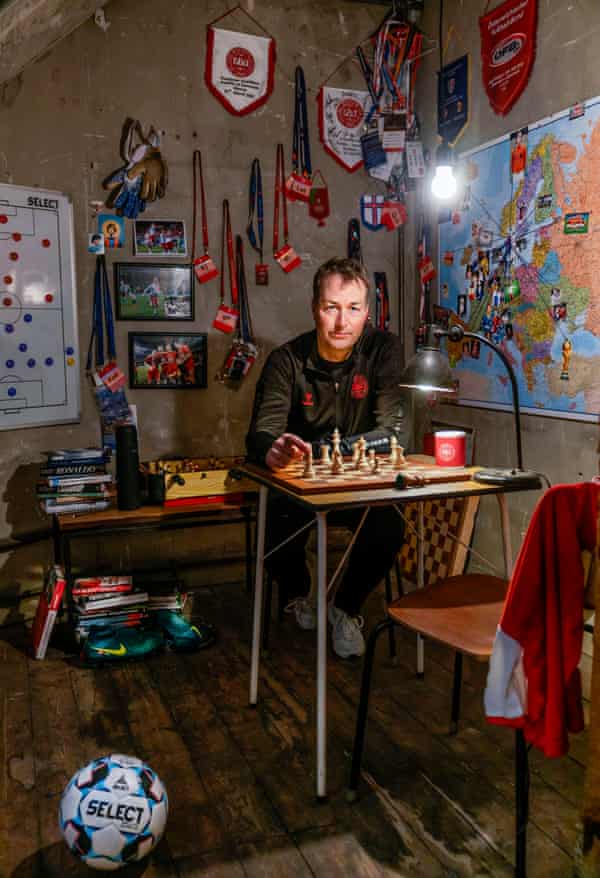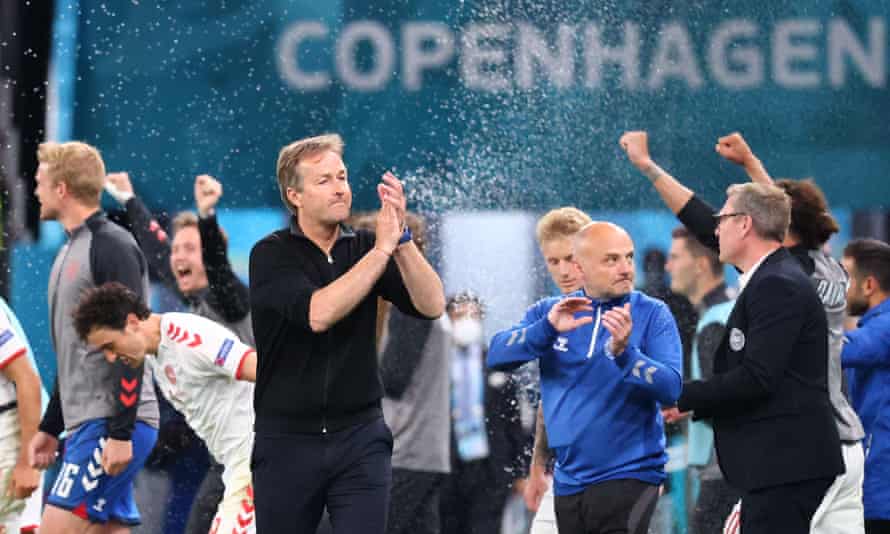He wasn’t even supposed to be in charge. If the pandemic had not happened, Kasper Hjulmand would have been watching Euro 2020 in the stands, taking notes and preparing to replace Åge Hareide as Denmark coach after the tournament. As it is, he has presided over the most tumultuous fortnight in the history of Danish football – and become a leader not only for the team but the whole country.
No one could have prepared Hjulmand for what happened against Finland on 12 June when Christian Eriksen had a cardiac arrest and was resuscitated on the pitch. It was a huge emotional drama but the 49-year-old has steered his players through it all with a remarkable degree of sensitivity and dignity.
Hjulmand had a special bond with Eriksen, who is recovering at home, and has repeatedly talked about what a great person the Internazionale playmaker is, as well as a fantastic footballer. The incident hit the coach hard but the way he responded has increased the support he has among the players.
After Denmark, who face Wales in the Euro 2020 last 16 in Amsterdam on Saturday, had beaten Russia 4-1 to secure progress from group B the captain, Kasper Schmeichel, said: “The players are rightly getting a lot of praise but there is one person we shouldn’t forget and that is Kasper Hjulmand.”
Known in Denmark to be a bit of a “football nerd” Hjulmand has transcended that perception in the past two weeks. “Kasper has been incredible in the way he has handled all of it, having focus on the fact that we shall continue to play football but that different people were in different places mentally,” the defender Simon Kjær told BT. “At the same time he had to deal with himself [and his feelings]. He has been a fantastic coach and leader for the team. I am very grateful I have him as my coach.”

Hjulmand had to end his football career as a 26-year-old after no fewer than nine knee operations but was soon making a name for himself in coaching. Having started at Lyngby he joined Nordsjælland as assistant coach in 2008 before being promoted to head coach three years later. He won the club their first Danish championship in 2012 before trying his luck in Germany, replacing Thomas Tuchel at Mainz at the start of the 2014-15 season.
The spell in Germany did not go to plan, Hjulmand lasting only seven months before returning to Denmark. At the time he and his family were shaken by an incident at the home for individuals with learning disabilities where his brother, Simon, was living.
A person at the home died after being restrained by staff and it had a profound effect on Hjulmand. “The next job has to be in Scandinavia,” he said in the biography Football Dreams, written by Morten Glinvand. Hjulmand also joined a campaign to ensure that there was better care for disabled people in Denmark. “It is time that we focus on the situation for disabled people in Denmark,” he said. “Denmark have signed up to the UN’s convention on the rights of persons with disabilities to ensure that everyone in Denmark, notwithstanding which disability they have, have the same possibilities to live a meaningful life.”
He was a controversial choice as Denmark coach when given the job in 2019, to take over a year later. He was seen as a football romantic, a lover of Barcelona and Johan Cruyff, whereas his predecessor, the successful Hareide, was more pragmatic. Hjulmand does not believe it is as black and white as that but the team have played some sensational football under him, not least in the first three qualifiers for the 2022 World Cup, beating Israel, Moldova and Austria, scoring 14 and conceding none.

The fascinating thing about Hjulmand is that even before the European Championship finals he was talking about creating an identity around the Denmark team. Who were they? How could the rest of the population identify with them? For him it was important to have the nation’s support.
“The results are the most important thing,” he said in an interview with Berlingske in June. “If we don’t get results I can sit here between now and Christmas Eve and talk and it wouldn’t matter. I want to give the people hope, where they are proud of the boys who are playing for the national team and that they can identify with them. They are role models and they accept that role.
“And that doesn’t just happen by accident; we can work on that because of the personalities that are in this team. We are going to have their identities in our play, their willingness to give everything they have, show who they are, show who we are. I hope a lot of people will be behind us. These players are burning madly for the national team.”
That has been clear in the past two weeks with Hjulmand at the forefront. “He has been very important,” says the defender Joakim Mæhle. “He is good at talking with the player and giving that freedom that many players need. He also showed his feeling after what happened with Christian and that he needed help too. What we have been through has just brought us closer together. He is a good coach and now a friend for us too.”
It is with that togetherness Denmark take on Wales. It is a formidable force for a team on an adventure they do not want to end. “We have been fortunate to have had the group stage in Denmark,” Hjulmand said this week. “I hope we are back at our training camp at Helsingør on Sunday preparing for a quarter-final.”
from Football | The Guardian https://ift.tt/3w66h0l
via IFTTT

No Comment